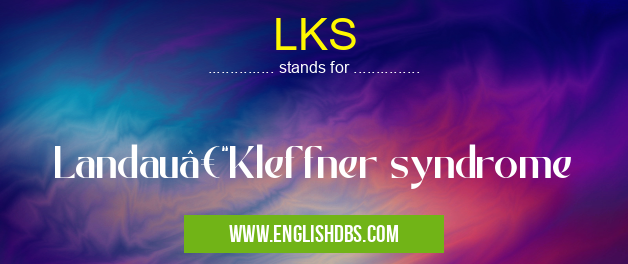What does LKS mean in DISABILITY
Landau—Kleffner Syndrome (LKS) is an epileptic disorder that affects both children and adolescents. It is a rare form of epilepsy and can cause language impairments in children. It typically occurs between the ages of three and seven, but can also affect older individuals. Symptoms include difficulty communicating, seizures, speech disturbances, learning disabilities and behavioral problems. Treatment usually focuses on reducing seizure activity as well as language therapy to help improve communication abilities.

LKS meaning in Disability in Medical
LKS mostly used in an acronym Disability in Category Medical that means Landau–Kleffner syndrome
Shorthand: LKS,
Full Form: Landau–Kleffner syndrome
For more information of "Landau–Kleffner syndrome", see the section below.
» Medical » Disability
Characteristics
The most noticeable symptom of LKS is difficulty with communication. Children may experience a loss or alteration in their ability to understand spoken words, comprehend written words, recall words or produce speech. Seizures are also common in those affected by LKS; these seizures may either be focal or generalized in nature. In addition, those affected by LKS may also display signs of learning disabilities and behavior problems such as hyperactivity or impulsivity. Lastly, some children may have difficulty sleeping.
Diagnosis
Diagnosis of LKS is typically made through a combination of physical examination, neurological evaluation and electroencephalogram (EEG). The EEG can be used to detect abnormal patterns known as interictal spikes and sharp waves which are characteristic of the syndrome. In some cases other imaging tests such as magnetic resonance imaging (MRI) or computed tomography (CT) scans may also be used to diagnose the condition. Additionally, auditory studies can be done to assess language comprehension and production levels in order to confirm diagnosis.
Treatment
Treatment for LKS typically involves a combination of medications to reduce seizure activity as well medical interventions such as vagal nerve stimulation (VNS), ketogenic dieting or brain surgery if needed. Additionally, language therapy can help improve communication abilities for those affected by this disorder by increasing auditory processing skills and helping develop appropriate verbal responses to stimuli presented in the environment. Lastly, those affected by LKS may benefit from psychological support for dealing with their condition as well as any associated behavior problems they may encounter due to their disorder.
Essential Questions and Answers on Landau–Kleffner syndrome in "MEDICAL»DISABILITY"
What is Landau—Kleffner syndrome?
Landau—Kleffner syndrome (LKS) is a rare neurological disorder that affects language development in children. It is characterized by sudden or gradual loss of a previously acquired ability to understand and use spoken language. It can also cause changes in the ability to speech, including difficulty with pronunciation, word production, and formulation of thoughts into sentences.
What are the symptoms of Landau—Kleffner syndrome?
The primary symptoms associated with LKS are regression in language understanding, comprehension and expressive skills; difficulty understanding what others are saying; impaired articulation or mispronunciation of words; poor grammar; delays in speech development; echolalia (repeating words or phrases); and decreased vocabulary. Other symptoms may include limited attention span, sleep disturbances, aggression and bizarre behaviors.
How common is LKS?
LKS is considered a rare disorder, affecting approximately 1 child per 250,000 to 500,000 worldwide.
Who can develop Landau—Kleffner Syndrome?
This condition primarily affects children between 3-7 years old. It can affect both genders but appears to be more common among boys.
What are the causes of this condition?
While the exact cause of LKS is unknown, some research suggests it could be linked to abnormal electrical activity in the brain caused by abnormal patterns of neuronal communication. It has been associated with certain genetic abnormalities, infections such as meningitis or encephalitis, head trauma or exposure to certain drugs prior to birth.
How is LKS diagnosed?
A diagnosis can be made based on an evaluation of physical and neurological signs along with developmental history taking by a medical professional such as a pediatrician or neurologist. An electroencephalogram (EEG) exam may be ordered to identify abnormal electrical activity in the brain associated with this condition. Other tests such as brain imaging scans may also help in the diagnosis process.
Is there any treatment available for LKS?
Yes, there are treatments available for those affected by this condition including medication therapy, behavioral interventions and intensive speech-language therapy programs tailored to meet individual needs and abilities.
Is it possible for children with LKS to make progress over time?
Yes, depending on the individual case's severity there have been cases where children were able to regain skills that were previously lost due to this condition through interventions such as speech therapy and medications used for treating epilepsy which can control seizures associated with this disorder if present.. Additionally, appropriate early interventions may help improve outcomes over time.
